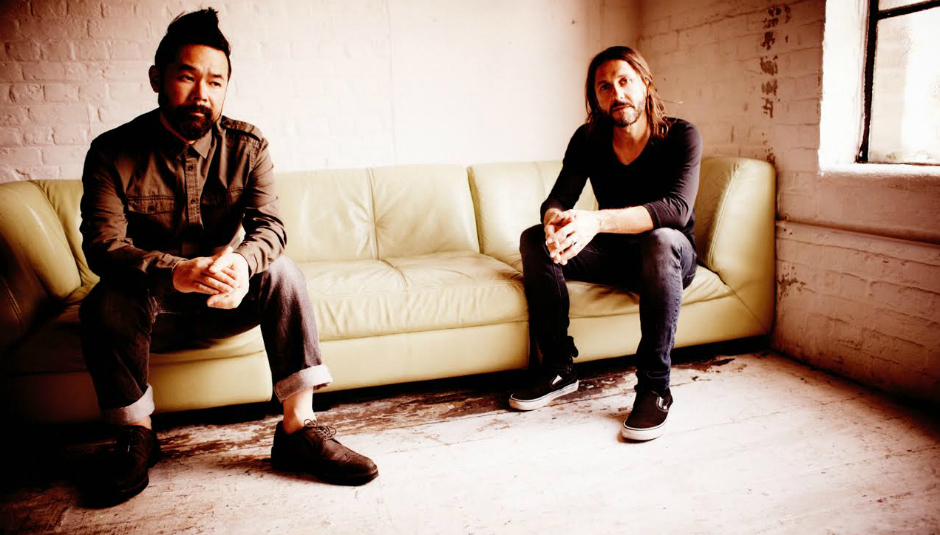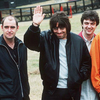Dan wrote for Under the Radar, the American indie music print magazine I edit and co-publish, for the last five years. I first tracked him down on Twitter in June 2012 after being impressed with some of his reviews for Drowned in Sound. I asked him if he’d want to write for Under the Radar and he said yes right away. And also right away we got into a discussion of Britpop, since it was his very funny negative reviews of albums by Britpop also-rans Cast and Dodgy, as well as his retrospective write up on Pulp’s early album Freaks, that had initially caught my eye. I was into Britpop in my late teens in college and he was exposed to it when he was a bit younger, because of his parents. Our age gap didn’t matter much, we still easily found common ground.
Dan jumped right in and was quickly an integral part of the Under the Radar team. Many new freelance writers come and go, often writing for us for maybe a year before fazing out, but some stick around for many years and an even smaller number become actual friends. Dan fell in the latter camp. Somewhere along the way what started as conversations about music turned into deeper chats about the challenges of relationships, both romantic and familial. When my dad was ill with cancer and then passed away in 2014, Dan was there to talk it through with me.
I won’t mislead and say that I knew him as well as his close friends in England. I spent very little time face-to-face with Dan, owing to the fact that he was in London and I’m based in America. But I am originally from London and we did spend some in-person time when I was visiting home around the time my father died, including having Dan over to my mum’s house for dinner where he also spent time with my wife (and Under the Radar partner) Wendy and our then 2-year-old daughter Rose.
As a writer, I admired his honesty and wit. Too often I find that music writers are too keen to simply write about the bands they love and not eager to give bad reviews, which is understandable, as all music writers start out as music fans. But the truly great ones don’t pull any punches when confronted with mediocre or bad records. In a climate where 7/10 seems to be the default rating for many music reviews, Dan wasn’t afraid to give an album a 1/10. A great recent example is his 2/10 review last year of the reissue of Oasis’ bloated third album, Be Here Now. Oasis might’ve been the band that he most loved to hate, and I knew when I assigned it to him I probably wouldn’t be getting a particularly positive review, but I also knew I would be getting a biting and very amusing one. I really hope that at his memorial someone plays some Oasis just to wind Dan up in the great beyond.
My thoughts go out to his girlfriend Liz, who I know he loved very much, and his parents, who clearly helped launch Dan into a life of loving music. 31 is far too young and it breaks my heart to think of what a bright future he’s been robbed of and the many more years of clever Simpsons references the rest of us will be missing out on.
To further wind up Dan I’ll end with the chorus to Oasis’ ‘Don’t Go Away’, from Be Here Now, which Dan wrote was “easily the album’s best song” and is oddly appropriate in this context.
“So don’t go away / Say what you say / But say that you’ll stay / Forever and a day in the time of my life / 'Cause I need more time, yes, I need more time / Just to make things right”
Mark Redfern
“We never planned on stopping.” I hope Grant Nicholas will forgive me for saying that, in 2016, Feeder are not what you would think of as a cool band. It’s four years and a solo “album-and-a-half” since their last album, 2012’s Generation Freakshow, but, as Nicholas tells me in a pub round the corner from his Crouch End home as they prepare to release their forthcoming album, All Bright Electric, “it was a case of ‘let’s just take a little break, everyone do a few different projects or whatever.’ In fact the only time Feeder nearly came to an end was after the suicide of their drummer Jon Lee in 2002.
“It was all over really,” says Nicholas. “We thought no one wants to see us without Jon, I don’t ever want to do it without Jon, I started the band with Jon. Maybe it’s just time to call it a day?”
Lee’s shocking death was, naturally, a seismic event for the band and it still affects Nicholas’s songwriting 14 years later. “I still think about it all the time,” he says. “I still think about him all the time. I miss hanging out with him, he was a good laugh. We were very competitive, the two of us, in a brotherly kind of way. We were really close; sometimes we’d argue cat and dog and then be best mates by morning. There was never any doubt that we’d always play in a band together.
“I think sometimes when you’re away from good friends and family and maybe you’re going through a bit of a bad time that I didn’t know about, or didn’t realise he was going through that kind of bad time, maybe he was just too far away in the wrong place. Maybe if he’d been here, who knows, it could have been different.
“There’s no point in going over it. I still think about it but we’ve moved on as a band now. He’s still there but it was a long time ago and I think time does help heal. When I play some of those old songs he’s always in there somewhere and I imagine him playing. But I think that’s a good thing. Any band that’s lost a member, you’re always going to feel like that.” Out of this tragedy came Feeder’s biggest album, 2002’s Comfort in Sound. Nicholas says: “What came out of losing Jon was the fact that it probably pushed me as a writer and made me write about different things, maybe with a different head space. It brought out some good tunes in a pretty awful time. “It was only the fact that I went into a studio, which is literally five minutes’ walk from here, The Crypt, where I locked myself away with an engineer and just wrote songs. And it just poured out of me. We went somewhere and got really pissed and were like ‘let’s do it again, let’s give it a go and see what we can do.’ And I’m pleased we did, because I wouldn’t be sat here talking to you now if we hadn’t. We probably would have stopped.”
This approach has kept the band going and on 7 October this year All Bright Electric will become their ninth studio album. The album shows one of Britain’s most reliably consistent bands doing what they have done for two decades: producing strong rock songs that are always reliable but never boring. “I’m still passionate about it and I’m very driven,” Nicholas says. “Music brings me alive. I’m not like that about everything! I’m pretty hard on myself and I do really push myself and push the band as far as I can to try and make it as good as we can.”
All Bright Electric is a strong album. It’s heavier and more raw than Feeder have been for years, which will perhaps come as a surprise to fans after Nicholas’s largely acoustic – “the more rocky songs I kept back, because I felt they were too Feeder-esque,” Nicholas says – solo records, Yorktown Heights and Black Clouds. “I genuinely believe I wouldn’t have made this kind of Feeder record if I hadn’t done that solo record,” he adds. “I think it’s brought something new to the way that I approach things, even the way that we recorded the record in some way. It’s a much more analogue, organic process than maybe some of the previous albums have been.” The opening track an lead single, ‘Universe of Life’ is a statement of sorts: it sets the tone by kicking off with a big, meaty riff that, like so much of their best work, pays tribute to their love of classic and alternative rock while still being instantly recognisable as Feeder.
“I had that riff,” he says hesitantly, “then I had this chorus that was very 70s in some way: [sings] ‘Seeing is believing and...’ I had Tommy in my head when I wrote that. I could almost imagine Roger Daltrey. I probably shouldn’t have said that! But I’m really proud of it.
“I wanted it to sound really current but touch on some of those great records that influenced me growing up. I don’t think it sounds like The Who but I think the album’s got a slight hint of the 70s in there in places. But we’re not trying to be a retro all-out band, that’s not what we are. But there are elements of it.”
To my ears, All Bright Electric is sonically the closest Feeder have come in 19 years to their debut, Polythene. “I haven’t really heard Polythene for a while,” admits Nicholas, “although I have been listening to ‘Descend’ and ‘Sweet 16’ [from 1996’s Swim EP] because we still play those live and they go well with the new stuff, as a lot of the [2010 album] Renegades stuff does as well.
“I think this record is different. I think we’ve learnt a lot as a band and I’m probably in a slightly more ... [pauses] I don’t know if confident is the right word but I feel like I know what I’m doing a bit more now. And I know there’s always that danger of people thinking a band’s been around too long and they get worse or they get very samey. But I think this album is quite different to a lot of the ones since Polythene. It’s different to Renegades and I only mention that because I think Renegades has some big guitars and it does touch on our early Feeder chemistry. I think this does as well but in a very different way.”
It’s clear over the course of our hour that Nicholas is proud of the 2010 “band within a band” project. The NME gave the album a harsh two-out-of-10 review, which cruelly said the band should break up. It wasn’t fair and you can’t blame the album’s writer for wanting to highlight its merits; they even opened their Isle of Wight festival slot with the title track. “You do take the knocks,” he says. “If you’re the writer in a band you’re the one who’s going to be slated in the press all the time. But you deal with that.” “Whether people love or hate Feeder I don’t think we could ever be criticised for not having a few tunes on each album. Some journalists who gave us a hard time over ‘Buck Rogers’ probably go to a festival, probably have a few beers and probably get quite into it [laughs]! I think they’re over it now and I’m over the criticism.”
Apologies once again to Grant but yes, once again we’re going to talk about that song. Has it become a burden? Their ‘Creep’? “If I didn’t have to play ‘Buck Rogers’ on a Feeder tour it wouldn’t upset me. But when you’re at a festival and you see the reaction it gets sometimes, sometimes you need songs like that. It’s a quirky track. It’s a pop song, it’s a bizarre song that did really well for us. But then ‘Just the way I’m Feeling’ was a massive radio song – it probably got more radio play than ‘Buck Rogers’ did – and it was on a bigger album. But it’s funny, that’s the one people sing to.
“I get more enjoyment out of playing [the songs from Renegades] than I do out of playing ‘Just a Day’ and ‘Buck Rogers’. Hand on heart I do, because I feel more connected with them and musically they’re where I feel comfortable. But from a reaction point of view, seeing the pure mayhem and joy on people’s faces, it’s great to play ‘Buck Rogers’ and ‘Just a Day’. It’s just great to see people happy hearing something that you’ve written. Anyone who complains about that is an idiot really. How can you complain about making people feel good about something?”
Well as he brought up ‘Just a Day’...
I saw Feeder twice at the Millennium Stadium in the early 2000s, playing that song to 70,000-odd people and then, a year ago, the DJ played it at a Drowned in Sound party to a bunch of us hipsters. It brought the house down both times. “I would say that’s as popular as ‘Buck Rogers’, if not more with some people. In Japan they go absolutely apeshit to it! I mean, we’ve had stage invasions in Japan on that song!
“It’s a very youthful, young song. It’s got an innocence and a charm to it and people go mad to it. I’m not going to second guess myself as to why: it just does. It’s got something in it, some formula or sound. And you know, it’s not... in the chorus it’s ‘I don’t want to bring you down’, it’s in this dark place. That’s what’s really weird about it! But it has this feel-good factor about it.”
And then there’s that video. I’ve often wondered whatever happened to those kids – I’m even toying with the idea of a “where are they now” piece on them. “I’ve met a few of them,” Nicholas reveals. “One guy works at Kerrang radio or he’s in that building [with TalkSport]. It was the kid who was playing the bass. I was in there and someone goes: ‘You know the guy that was in the "Just a Day" video? He works in the office.’ He wanted to meet me. He’s about 6’7" I think. He was ginormous! I was like ‘are you the kid from the video!?’”
The guy he’s talking about is Mark Higgins who, by strange coincidence, turns out to be a friend of a friend of mine. The young girl in the white shirt playing a red guitar is a recent graduate while her brother, the baby in the video, has just started uni in Manchester and looks a bit like Joffrey from Game of Thrones (if any of you three are reading this and are slightly spooked, I am a professional journalist, not some weirdo; yes there’s a difference).
Nicholas recalls how the video came to be. “We were on tour in Europe. This guy said he had this idea where he wanted to do a kind of You’ve Been Framed thing. I was like ‘oh no this sounds awful’. “And I remember being sent it. We were on our tour bus and we sat down, me and Jon looked at each other and we just ... [drops his jaw]. Everyone did. We didn’t know what to say. We were like, ‘this is either the worst video we’ve ever made and ever seen, or it’s the best we’ve ever done.’ It was that – there was no inbetween.”
Seeing what some of those kids look like now is a stark reminder of just how long Feeder have been doing this. They might not be critical darlings – although we’ve always loved them here at DiS – but their longevity is impressive and is probably down to their consistent refusal to disappoint. “We’ve always been trying to move forward and that will continue for as long as I feel like we can still hang out as a band and have a drink and not hate each other. And hopefully making good music. When I feel like we really can’t do this anymore and we’re just going through the motions I honestly will stop doing it. But I’m not there yet. I think there’s more to do.”






















